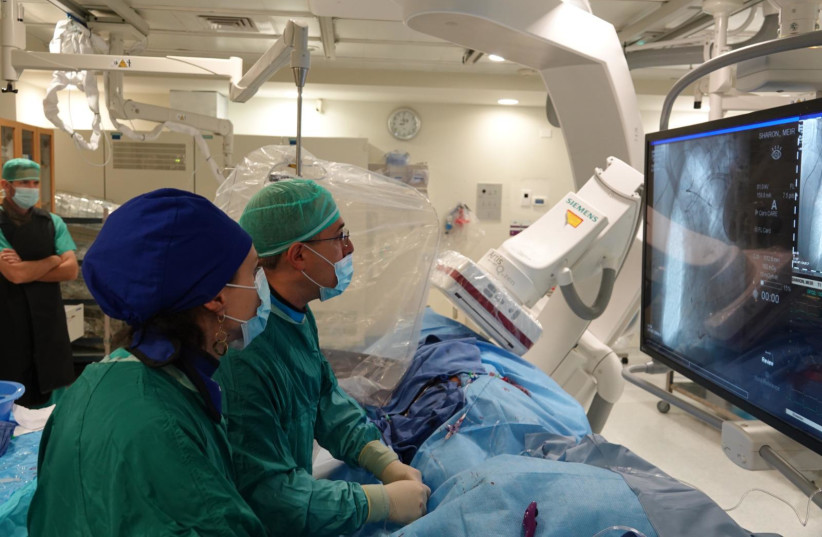Jerusalem’s Shaare Zedek Medical Center (SZMC) is the first medical center in Israel and Europe and among the first in the world to start valve catheterization to prevent heart failure.
As part of an international study in which the hospital’s cardiac catheterization unit headed by Dr. Dani Dvir is taking part, patients with moderately severe valvular stenosis (narrowing) who have not been treated so far will be catheterized and, it is hoped, will be able to return to full function before their condition worsens. This is a potential improvement in the health of millions of patients worldwide, Dvir said.
Catheterized valve transplant operations are successfully performed here in patients with severe and symptomatic stenosis of the aortic valve – an operation known as Transcatheter Aortic Valve Implantation (TAVI). Patients with heart failure may suffer a significant worsening of their condition even when the stenosis of the aortic valve is less severe. In this situation, the alternative is taking several medications, sometimes in very high doses, with a result that is sometimes not optimal.
The possibility of treating moderately severe stenosis of the valve in patients with heart failure is currently being tested in a groundbreaking global study called EXPAND II. Thanks to Dvir’s extensive experience as director of the invasive cardiology unit and catheterization rooms, in catheterization operations, SZMC was chosen to participate in the study.
First patient in Israel was successfully treated

The first patient in Israel – who is the first in European countries as part of this study and one of the first of this kind in the entire world – was successfully treated at the hospital by Dvir.
The 67-year-old patient suffered from advanced heart failure with four hospitalizations in the past months, but the occlusive stenosis he suffered from was of moderate severity which, according to standard medical criteria, does not justify catheterization.
“The patient recently underwent a valve replacement with a catheter in this setting, and we are already anticipating an improvement in his functional level,” Dvir announced. “If the results of this study show an advantage in the treatment of patients with heart failure and aortic valve stenosis of moderate severity, the population of patients designated for TAVI could increase considerably, beyond the significant increase that has already occurred in this activity in recent years.
“The treatment of patients with heart failure includes drugs from different families designed to ease the heart’s activity,” he said. “Patients with congestive heart failure and aortic valve stenosis of moderate severity may improve medically with catheter-based valve replacement therapy. These operations to replace the valve with a catheter have been performed on a daily basis in recent years with great success and we are happy to take part in this significant research.”
Prof. Tal Hasin, director of SZMC’s heart failure unit, said that “relieving the burden on the patient’s heart with this catheter operation makes medical sense. This is an opportunity to thank the patient and his family and our entire team for allowing us to lead this research breakthrough.”
Prof. Michael Glikson, director of the medical center’s Integrated Heart Center added: “Our cardiology led by the catheterization specialists constantly strive to be at the cutting edge of technology and seek a therapeutic and medical solution for patients suffering from various cardiac problems. Many studies have already testified to the importance of treating severe aortic stenosis in improving the quality of life and prolonging life. We are happy to be at the forefront and expand the use of TAVI to additional populations.”
